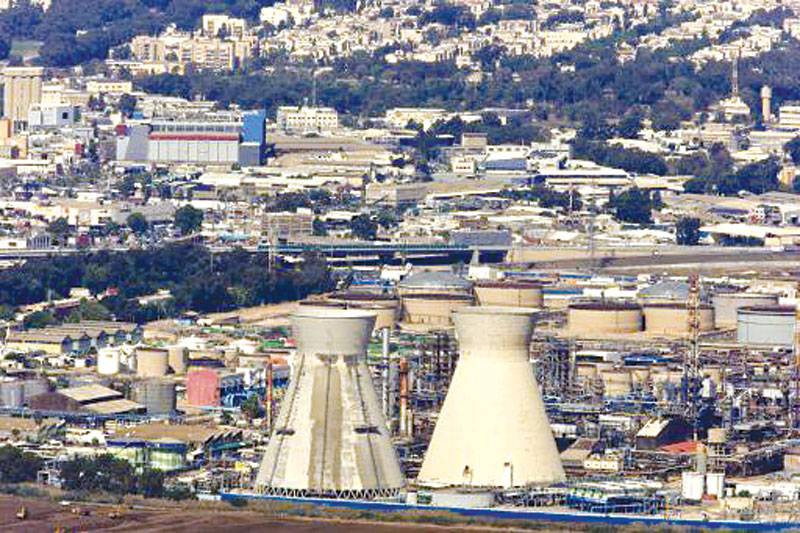JERUSALEM : The mayor of Haifa, Israel's third largest city, ordered Sunday the closure of five petrochemical plants following a health ministry warning linking high cancer rates to air pollution.
Haifa Mayor Yona Yahav further said that municipality trucks were blocking the entrances to Israel Oil Refineries and Petroleum & Energy Infrastructures, both of which are based on the bay in the northern port city.
‘From now on, no tankers will have access to the factories,’ he said in remarks relayed by his office, which said five factories had been ordered to shut down.
The move came after a senior health ministry official sent a letter to the interior ministry's planning department warning of a disproportionately high cancer rate in the Haifa area due to the operation of such plants.
Written by Professor Itamar, the letter quoted Hebrew University research published which found ‘an increased risk of developing cancer in a heavily-industrialised sub-district’ of the city.
The letter was submitted as part of an appeal against plans to expand oil refineries in the area.
‘Compared to the incidence in the rest of Israel, the Haifa subdistrict population had an elevated hazard ratio of lung, head and neck, colo-rectal, gastric and oesophagus, bladder and cervical carcinoma,’ the researchers wrote.
‘If the latest data is correct, we demand an immediate halt to all operations of the polluting factories in the Greater Haifa area,’ Yahav said.
The environmental protection ministry confirmed the Haifa Bay area ‘ranked first in pollutant emissions in Israel’ while noting that the research was based on data from a decade ago and there had been ‘a 70 percent drop in air pollution’ in the bay area over the past six years. In a statement, Israel Oil Refineries said it had invested over one billion shekels ($255 million/236 million euros) in ‘preserving the environment and diminishing pollutant emissions.’ The company, which describes itself as Israel's ‘largest integrated refining and petrochemical group,’ said ‘objective bodies’ had measured ‘dramatic improvements’ in pollution levels.
Wednesday, November 20, 2024
Israeli port city closes 5 factories over cancer fears

Silent pandemic of antibiotic resistance threatens Pakistan’s health sector, warn experts
9:32 PM | November 20, 2024
PM Shehbaz urges Senate to play role in promoting national unity
8:28 PM | November 20, 2024
CII Chairman clarifies VPN stance, blames typographical error
8:17 PM | November 20, 2024
Imran Khan's release uncertain despite bail in Toshakhana case: Tarar
8:02 PM | November 20, 2024
Rangers, FC deployed in Islamabad ahead of PTI protest
7:49 PM | November 20, 2024
-
Hunger crisis to increase in South Sudan, warns UN
-
Hunger crisis to increase in South Sudan, warns UN
-
Pakistan’s judiciary champions climate justice at COP29 in Baku
-
Punjab struggles with persistent smog as Met Office forecast rainfall
-
Punjab residents face escalating smog crisis as pollution levels soar across country
-
Qatar says Hamas 'no longer welcome' in Gulf state
Digital Stagnation
November 20, 2024
Xi’s Red Lines
November 20, 2024
Last Call
November 20, 2024
Sindh & Indus
November 19, 2024
Another US Escalation
November 19, 2024
Tackle Corruption Within School Boards
November 20, 2024
To Be Opportunistic
November 20, 2024
Democratic Backsliding
November 20, 2024
Empowering Tharparkar through Skills Development
November 20, 2024
Why Not Use AI to Address Climate Change?
November 19, 2024
ePaper - Nawaiwaqt
Nawaiwaqt Group | Copyright © 2024





